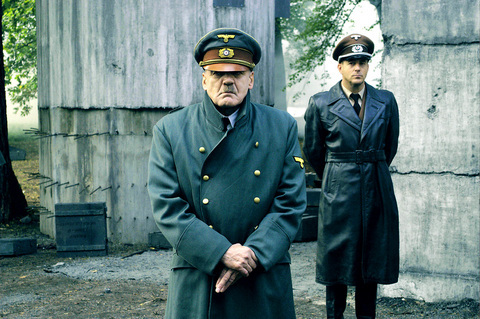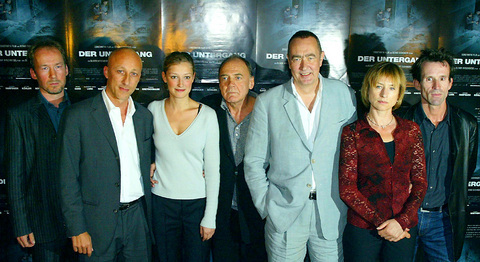According to Downfall, one of the last meals Adolf Hitler ate before he killed himself in his Berlin bunker was ravioli. Cheese, of course, for as this painstaking (and sometimes painful) film reminds us, the Fuhrer did not eat meat. Apparently, he enjoyed the ravioli, complimenting the cook who made it and cleaning his plate while his dinner companions, who included his secretary, Traudl Junge, and his lover, Eva Braun, were too preoccupied to do much more than pick at their food and smoke cigarettes.
Their distraction is understandable. The Soviet Army was a few blocks away, and the once-fearsome Nazi military machine had all but collapsed. Hitler's calm demeanor may have been a sign of his own increasingly demented state, as, at least in the movie's rendition of his last days, it came between bouts of raving paranoia and delusional schemes to revive his shattered armies to fight off the advancing Allied forces.
Directed by Oliver Hirschbiegel, Downfall shifts its gaze back and forth between the crumbling military situation on the ground in Berlin and the bizarre domestic situation in the bunker underneath it, combining high wartime drama with a sense of mundane detail that verges on the surreal. It is fascinating without being especially illuminating, and it holds your attention for its very long running time without delivering much dramatic or emotional satisfaction in the end.

PHOTO: AFP
At times the German movie, which was nominated for the Academy Award for best foreign film, has the self-conscious intimacy of a behind-the-scenes celebrity portrait. More often, it has the starchy staginess of one of those made-for-cable historical dramas that give actors of reputation (usually British) the chance to put on vintage uniforms and impersonate figures of world-historical importance, either monstrous or heroic.
Bruno Ganz, the fine Swiss-born actor who, in the course of a long career, has tended more toward world-weariness than monstrosity, tackles the biggest monster of them all with appropriate sobriety and a touch of mischief. He does some scenery chewing, and while he looks, at 64, older than Hitler did at 56 (and also kindlier), he has clearly studied Hitler's vocal and physical mannerisms closely.
The challenge Ganz faces, which Hirschbiegel, working from a screenplay by Bernd Eichinger, does not quite allow him to meet, is to make Hitler a plausible character without quite humanizing him. To play Hitler is to walk into a paradox. Sixty years after the end of World War II, he continues to exert a powerful fascination: We still want to understand not just the historical background of German National Socialism, but also the psychological and temperamental forces that shaped its leader. At the same time, though, there is still a powerful taboo against making him seem too much like one of us. We want to get close, but not too close.

PHOTO: AFP
A few years ago, Menno Meyjes's Max, a flawed but not dishonorable attempt to explore Hitler's earlier life as a failed artist in Vienna, was widely criticized (often by people who had not seen it) for giving him too much humanity. Curiosity carries with it a sense of moral risk, as if understanding Hitler might be the fateful first step toward liking him.
But of course, millions of Germans -- most of them ordinary and, in their own minds, decent people -- loved Hitler, and it is that fact that most urgently needs to be understood, and that most challenges our own complacency. Accordingly, the real subject of Downfall, Ganz's intriguing, creepily charismatic performance notwithstanding, is not Hitler at all, but rather his followers: the officers, bureaucrats and loyal civilians who were with him at the end.
Some of these are well known, like Eva Braun (Juliane Kohler), the architect Albert Speer (Heino Ferch) and Joseph Goebbels (Ulrich Matthes), who died, along with his wife, Magda (Corinna Harfouch), and their six children, in the bunker with their leader. Other people who figure in this story -- which manages to be at once sprawling and claustrophobic -- are lesser officers in the SS, and members of Hitler's bodyguard and household staff, including Traudl Junge (Alexandra Maria Lara).

Cheng Ching-hsiang (鄭青祥) turned a small triangle of concrete jammed between two old shops into a cool little bar called 9dimension. In front of the shop, a steampunk-like structure was welded by himself to serve as a booth where he prepares cocktails. “Yancheng used to be just old people,” he says, “but now young people are coming and creating the New Yancheng.” Around the corner, Yu Hsiu-jao (饒毓琇), opened Tiny Cafe. True to its name, it is the size of a cupboard and serves cold-brewed coffee. “Small shops are so special and have personality,” she says, “people come to Yancheng to find such treasures.” She

In July of 1995, a group of local DJs began posting an event flyer around Taipei. It was cheaply photocopied and nearly all in English, with a hand-drawn map on the back and, on the front, a big red hand print alongside one prominent line of text, “Finally… THE PARTY.” The map led to a remote floodplain in Taipei County (now New Taipei City) just across the Tamsui River from Taipei. The organizers got permission from no one. They just drove up in a blue Taiwanese pickup truck, set up a generator, two speakers, two turntables and a mixer. They

Former Chinese Nationalist Party (KMT) chairwoman Hung Hsiu-chu’s (洪秀柱) attendance at the Chinese Communist Party’s (CPP) “Chinese People’s War of Resistance Against Japanese Aggression and the World Anti-Fascist War” parade in Beijing is infuriating, embarrassing and insulting to nearly everyone in Taiwan, and Taiwan’s friends and allies. She is also ripping off bandages and pouring salt into old wounds. In the process she managed to tie both the KMT and the Democratic Progressive Party (DPP) into uncomfortable knots. The KMT continues to honor their heroic fighters, who defended China against the invading Japanese Empire, which inflicted unimaginable horrors on the

Hannah Liao (廖宸萱) recalls the harassment she experienced on dating apps, an experience that left her frightened and disgusted. “I’ve tried some voice-based dating apps,” the 30-year-old says. “Right away, some guys would say things like, ‘Wanna talk dirty?’ or ‘Wanna suck my d**k?’” she says. Liao’s story is not unique. Ministry of Health and Welfare statistics show a more than 50 percent rise in sexual assault cases related to online encounters over the past five years. In 2023 alone, women comprised 7,698 of the 9,413 reported victims. Faced with a dating landscape that can feel more predatory than promising, many in